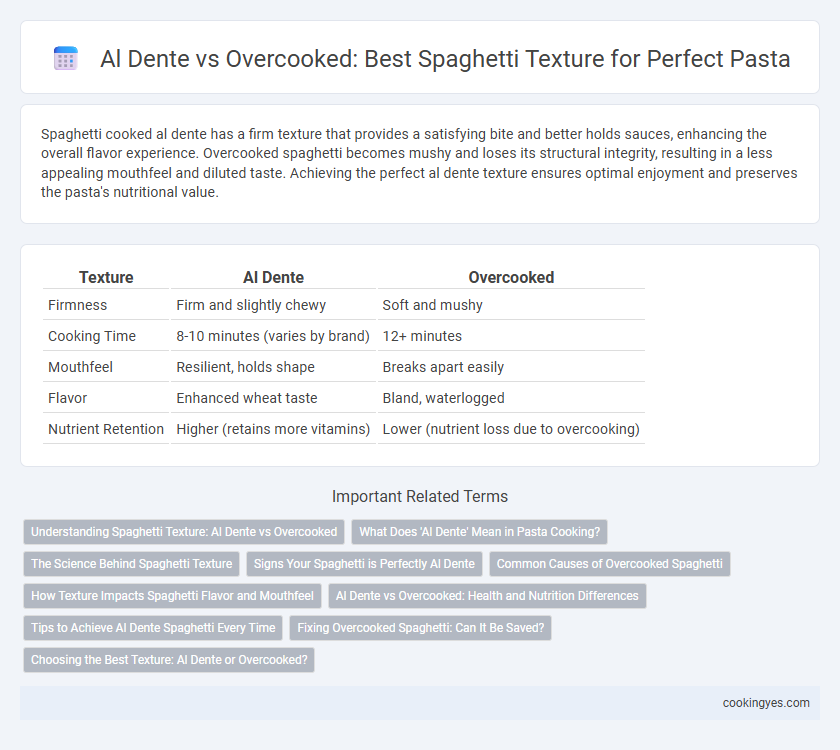Spaghetti cooked al dente has a firm texture that provides a satisfying bite and better holds sauces, enhancing the overall flavor experience. Overcooked spaghetti becomes mushy and loses its structural integrity, resulting in a less appealing mouthfeel and diluted taste. Achieving the perfect al dente texture ensures optimal enjoyment and preserves the pasta's nutritional value.
Table of Comparison
| Texture | Al Dente | Overcooked |
|---|---|---|
| Firmness | Firm and slightly chewy | Soft and mushy |
| Cooking Time | 8-10 minutes (varies by brand) | 12+ minutes |
| Mouthfeel | Resilient, holds shape | Breaks apart easily |
| Flavor | Enhanced wheat taste | Bland, waterlogged |
| Nutrient Retention | Higher (retains more vitamins) | Lower (nutrient loss due to overcooking) |
Understanding Spaghetti Texture: Al Dente vs Overcooked
Al dente spaghetti has a firm texture with a slight resistance when bitten, preserving the pasta's shape and enhancing the sauce absorption. Overcooked spaghetti becomes soft and mushy, losing its structural integrity and resulting in a less satisfying mouthfeel. Cooking pasta to the perfect al dente point ensures optimal texture and taste, crucial for authentic Italian dishes.
What Does 'Al Dente' Mean in Pasta Cooking?
'Al dente' refers to pasta cooked to be firm to the bite, achieving the ideal texture where the spaghetti is tender yet slightly resistant when chewed. This texture preserves the pasta's structure, preventing it from becoming mushy, which often occurs with overcooked spaghetti that loses its integrity and becomes overly soft. Mastering al dente cooking enhances the eating experience by maintaining the perfect balance of firmness and tenderness in each strand.
The Science Behind Spaghetti Texture
Spaghetti achieves its ideal texture when cooked al dente, as the starch granules within the pasta swell but remain intact, providing a firm bite and optimal chewiness. Overcooking causes these starch granules to burst and release excess amylose and amylopectin, leading to a mushy, sticky texture and loss of structural integrity. The heat disrupts the protein network in the durum wheat, diminishing elasticity and resulting in a less desirable mouthfeel.
Signs Your Spaghetti is Perfectly Al Dente
Perfectly al dente spaghetti has a firm, slightly chewy texture that offers resistance when bitten, without being hard or mushy. The surface appears dry and not overly soft, with strands holding their shape without sticking together. A slight core of firmness remains in the center, indicating the pasta is cooked just right for optimal texture and flavor absorption.
Common Causes of Overcooked Spaghetti
Overcooked spaghetti results from prolonged boiling time and excessive heat, causing the pasta to lose its firm, al dente texture and become mushy. Using too much water or failing to monitor cooking time closely often leads to overstated softness, compromising the ideal bite. Improper stirring or using low-quality pasta varieties can also contribute to uneven cooking and a soggy final texture.
How Texture Impacts Spaghetti Flavor and Mouthfeel
Al dente spaghetti offers a firm bite that enhances flavor release and provides a satisfying, chewy texture that balances well with sauces. Overcooked spaghetti becomes mushy, causing flavors to dilute and creating a less appealing, slippery mouthfeel that diminishes overall enjoyment. Texture directly influences perception of taste and sauce adherence, making al dente the preferred choice for enhancing spaghetti's sensory experience.
Al Dente vs Overcooked: Health and Nutrition Differences
Al dente spaghetti retains a firmer texture and preserves more nutrients like resistant starch, which supports better digestion and stabilizes blood sugar levels. Overcooked spaghetti becomes softer and has a higher glycemic index, leading to quicker blood sugar spikes and potential nutrient loss. Choosing al dente pasta helps maintain a lower calorie impact and enhances satiety compared to overcooked, mushy pasta.
Tips to Achieve Al Dente Spaghetti Every Time
To achieve perfectly al dente spaghetti, cook the pasta for 1-2 minutes less than the package instructions, ensuring a firm yet tender bite. Use a large pot with plenty of boiling salted water to prevent sticking and promote even cooking. Test the texture frequently in the final minutes, draining immediately once the core is just tender, then rinse briefly with hot water to stop the cooking process.
Fixing Overcooked Spaghetti: Can It Be Saved?
Overcooked spaghetti becomes mushy and loses its desirable al dente firmness, but it can be improved by quickly rinsing in cold water to halt further cooking and draining excess moisture. Tossing the strands in a hot pan with a bit of olive oil or sauce helps restore some texture by adding a slight crispness to the outer layer. Incorporating overcooked spaghetti into baked dishes or soups also masks the softness while enhancing overall flavor and mouthfeel.
Choosing the Best Texture: Al Dente or Overcooked?
Al dente spaghetti, characterized by a firm and slightly chewy texture, preserves more nutrients and provides better bite compared to overcooked pasta, which becomes soft and mushy due to excessive water absorption. Cooking spaghetti al dente enhances flavor retention and improves digestion by slowing starch absorption, while overcooked spaghetti loses structural integrity and often results in a bland, less satisfying dish. For optimal texture and culinary quality, achieving al dente is preferred, especially when pairing with rich sauces that complement the pasta's firmness.
Al dente vs Overcooked for spaghetti texture Infographic

 cookingyes.com
cookingyes.com